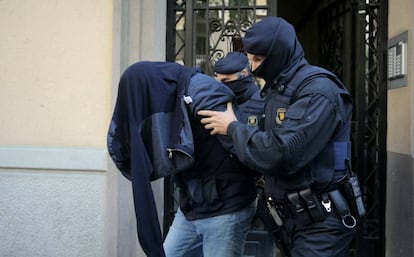Terrorists arrested in Barcelona were at Brussels airport on day of attacks
Mohammed Lamsalak and Youssef Ben Hammou are being held in custody in Spain

Two out of the nine terror suspects arrested on Tuesday in Barcelona province in anti-jihadist raids were in Brussels on March 22, 2016, the day of the attack against the airport and subway system in the Belgian capital. Mohammed Lamsalak and Youssef Ben Hammou have now been placed in provisional detention on orders from Judge Eloy Velasco of the Audiencia Nacional, Spain’s High Court, along with three other suspects.

The anti-terrorism operation is one of the largest to have taken place in the northeastern region in recent months.
Lamsalak and Ben Hammou arrived in the Belgian capital on March 16 of last year and left on the 23, a day after the attacks that left dozens dead, according to investigators. A third detainee, Ahmed Aafoulah Beliuafz, has been jailed on charges of arms possession and crimes against public health. The other two, whose identity has not been released, are being held in prison for unrelated cases currently underway in the Catalan courts.
The Belgian judge and prosecutor in charge of investigating the attacks were present during the interrogation
Four other suspects who were detained during the raids have been released, but must show up in court once a month, legal sources have confirmed.
The Belgian judge and prosecutor in charge of investigating the Brussels attacks were present during the interrogation in Spain on Thursday. Ben Hammou and Lamsalak are believed to have ties with individuals who were involved in those attacks. Legal sources said that both men admitted that they were inside Brussels Zaventem Airport when the bombs went off, although they denied any involvement in the blasts and claimed that they went to Brussels to purchase a vehicle.
Suspects with records
The investigation was triggered eight months ago based on information supplied by members of the public and on preventive work by the regional Catalan police force, the Mossos d'Esquadra. "They have not carried out any actions in Catalonia," explained Josep Lluís Trapero, the head of the Mossos, about the suspects. "They are between 31 and 39 years old, with police records, and several of them have ties to drug trafficking." In an interview with regional channel TV3, Trapero added that the suspects under arrest are Moroccans residing in Catalonia.
Investigators are trying to determine whether the money that was allegedly going to be used to buy a car was meant to finance the attack or help with post-bombing logistics. Lamsalak and Ben Hammou have admitted that they spent time with a cousin of the perpetrators – two brothers who acted as suicide bombers – but denied any personal acquaintance with the latter, according to their deposition.
Four days before the attack against the airport in Brussels, Belgian authorities had arrested Salah Abdeslam, a terrorist who fled Paris after participating in the attack against the Bataclan nightclub on November 9, 2015. Investigators believe that this arrest triggered the Brussels attack.
Up to 450 citizens or residents of Spain have traveled to Syria and Iraq over the last two years to join the so-called Islamic State (ISIS), according to a study released late last year by a Moroccan think tank. The figure more than doubles the official number of Spain-based recruits estimated by the Interior Ministry, which talks about 190 individuals. Catalonia is considered one of the hotbeds of jihadist activity in Spain.
English version by Susana Urra.
Tu suscripción se está usando en otro dispositivo
¿Quieres añadir otro usuario a tu suscripción?
Si continúas leyendo en este dispositivo, no se podrá leer en el otro.
FlechaTu suscripción se está usando en otro dispositivo y solo puedes acceder a EL PAÍS desde un dispositivo a la vez.
Si quieres compartir tu cuenta, cambia tu suscripción a la modalidad Premium, así podrás añadir otro usuario. Cada uno accederá con su propia cuenta de email, lo que os permitirá personalizar vuestra experiencia en EL PAÍS.
¿Tienes una suscripción de empresa? Accede aquí para contratar más cuentas.
En el caso de no saber quién está usando tu cuenta, te recomendamos cambiar tu contraseña aquí.
Si decides continuar compartiendo tu cuenta, este mensaje se mostrará en tu dispositivo y en el de la otra persona que está usando tu cuenta de forma indefinida, afectando a tu experiencia de lectura. Puedes consultar aquí los términos y condiciones de la suscripción digital.








































